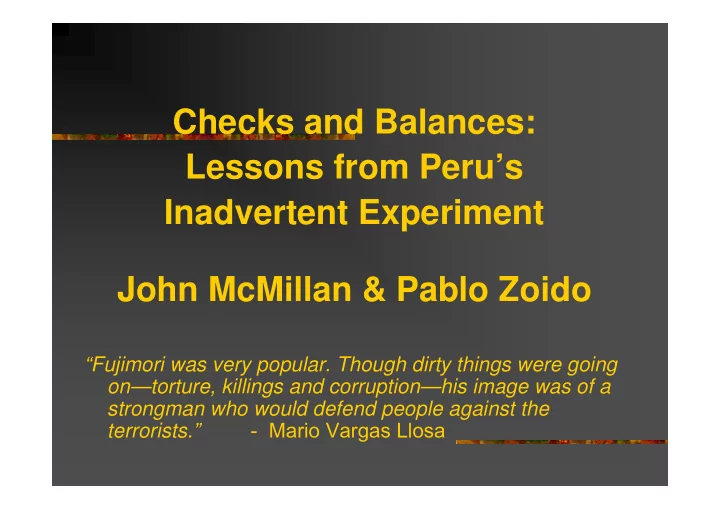

Checks and Balances: Lessons from Peru’s Inadvertent Experiment John McMillan & Pablo Zoido “Fujimori was very popular. Though dirty things were going on—torture, killings and corruption—his image was of a strongman who would defend people against the - Mario Vargas Llosa terrorists.”
The wages of SIN Bribe payment per month: Politicians: $5,000 - $20,000 Judges: $5,000 - $10,000 Newspapers: ~$60,000 TV channels: $500,000 - $1,500,000 Approximate monthly totals: Judges and politicians: < $300,000 TV channels: > $3 million
The odd couple Montesinos on Fujimori: “He is completely malleable: he does nothing at all without my knowing it.” Fujimori on Montesinos: “It was an extremely grave error to appoint Montesinos. Nobody imagined that, behind the scenes, he was working for himself.”
Why videotape bribery? 1. Simple record-keeping (1,200 people bribed). 2. Montesinos’s proof of the others’ complicity: - a threat to use against bribees if all collapsed - the tapes meant Fujimori could not fire him. “If I am screwed, then so are all of you.” - Montesinos to TV owners “If necessary, I can set the prairie on fire.” - Montesinos to Fujimori
Meticulous record-keeping - receipts for bribes - written contracts - videotaped meetings “The addiction to information is like the addiction - Montesinos to drugs.”
Politician’s contract Compromiso de honor : An opposition congressman agrees to switch to Fujimori’s Peru 2000 for a duration of five years. He promises to “act in close collaboration” with Montesinos, from whom he will “directly receive instructions.”
A TV channel’s contract Montesinos will review each day’s news before it airs. The TV channel will not broadcast any mention of politics without his written approval. Montesinos will pay US$500,000 a month. The channel will give him a letter of credit. Late penalty: 1% per day, 5% after 7 days. Montesinos’s contractual duties include, “To do whatever else is necessary.” Montesinos may resolve a dispute, the channel having “no right to complain in any way.”
Complementary checks and balances One check is stronger when another check is in place. If one is weak, all are weak: news media ↔ judiciary judiciary ↔ opposition politics opposition politics ↔ news media “No television channel aired the press conference [of presidential candidate Andrade] . It never - Montesinos existed.”
Why is television the crucial check? “If we do not control television, we do not do - a Montesinos aide anything.” 1. TV owners have bargaining (holdup) power; judges and politicians don’t. 2. An informed citizenry is the fundamental check: - TV makes gov’t lapses common knowledge. - “It is not enough that the truth is known by someone else. The voters must have it, all of (Meiklejohn, 1948). them”
Is authoritarianism justified? Fujimori: “History will judge Fujimori to be the one who saved Peruvian democracy.” Shleifer et al: “Montesinos’s corrupt deals reflect a move to eliminate disorder, which was probably efficient.” Barro: “Fujimori’s curtailment of democracy led to important economic reforms, to success against terrorism, and in a few years to a restoration of democracy.”
The cost of SIN Checks and balances are hard to rebuild: - democracy can die ($10,000 cutoff) Uncertain property rights and contracting: - in a 2001 poll, 72% of Peruvian managers said “the uncertainty generated by the judiciary is a very serious obstacle.” Fighting terrorism and reforming the economy did not need autocracy.
Head-of-state embezzlers 1. Suharto, Indonesia $25 b . ($700 per capita) 2. Marcos, Philippines $8 b . ($900) 3. Mobutu, Zaire $5 b . ($100) 4. Abacha, Nigeria ($300) $3 b. 5. Milosevic, Serbia (n/a) $1 b. 6. Fujimori, Peru $600 m . ($2,000) Source : Transparency International
Quantifying checks and balances Checks and balances matter. - Fujimori won an electoral mandate, but by overriding the checks, he ran an autocracy With $2000 per capita income, the shadow price (per year) of: the judiciary = $3 m. the legislature = $4 m. the news media = $40 m. Building a free press is the key step in building a democracy.
Designing incentives Elections, alone, don’t make a democracy. Agency theory meets The Federalist Papers : with high-powered incentives, allow autonomy; with low-powered incentives, need controls. (Holmstrom & Milgrom, AER , Sept. 1994) Discretion versus controls: - salespeople > CEOs > heads of state - “I have a mandate”
Implications for new democracies Electoral democracies now number 121, nearly double 1987’s 66 .
Implications for new democracies Percentage of the world’s countries, by extent of political rights and civil liberties: [Freedom House] 1972 2002 free 29% 46% partly free 25% 29% not free 46% 24% The Montesinos virus: a newly discovered cancerous disease found in contemporary - Adam Michnik democratic states.”
Are there implications for NZ? Are NZ’s checks and balances strong enough? Single house, no written constitution, little judicial oversight of legislation. - “The executive wields extraordinary power …fundamental rights are protected only by goodwill and trust .” - “An elective dictatorship .”
Are there implications for NZ? Competition policy toward the news media: - The media, with their oversight role, should not be assessed like an ordinary industry. - Two newspapers: enough competition?
Recommend
More recommend